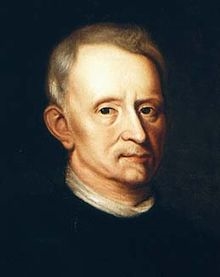 |
| Possible protrait of Robert Hooke |
Robert Hooke was born in Freshwater, Isle of Wight, England, 18 July 1635. His father, John Hooke, was a curate in All Saints Church in Freshwater. John Hooke was also a private tutor in a small school attached to the church. Robert had an older brother, called John, like his father, who was five years older than him.
Robert Hooke’s father was from a family in which it was expected that all the boys in that family joined the church. So, Robert’s parents were trying hard to advance his education, but Robert, like many children of his day did not have good health and was not expected to reach adulthood. Finally, his parents gave up his education and let him educate himself by his own devices.
In fact, Robert Hooke was very talented at science and also at drawing. At that time, there was a portrait painter, John Hoskyns, who was working at Freshwater, and Robert usually watched him at work. He studied from Hoskyns how to used pen and chalk and then he tried to make copies of Hoskyns’s portraits.
In 1648 his father, John Hooke, died and at the same time, Robert’s family decided that drawing was the best way for Robert to earn a living. His family sent him to London to study from a famous portrait painter, Peter Lely. Robert learned much from him, but soon he decided that studying under Peter Lely would waste a lot of his money, so he chose a school education and got into Westminster School. At Westminster he learned many things like Latin, Greek, Music, Mechanics, Geometry and so on. In 1653, he entered Christ College, Oxford. "He began to study at Oxford at a particularly significant time for Thomas Willis, Seth Ward, Robert Boyle, John Wilkins, Christopher Wren and William Petty were among those who regularly met as the “Oxford branch” of the “invisible college” which had been set up in 1648-1649 when some of the scientists meeting in London moved to Oxford."
In 1655 Boyle was looking for an assistant and Thomas Willis recommended Robert Hooke to him. Because of this, Hooke started to do many experiments and observations. Some of his experiments and observations, often used even now, include the theory about cells in biology and Hooker’s theory about spirals in physics. Robert Hooker died in London, England, 3 March 1703 in the age of 68.
Page created on 4/7/2006 12:00:00 AM
Last edited 4/7/2006 12:00:00 AM
